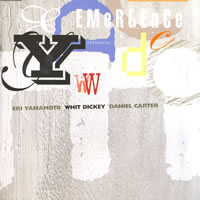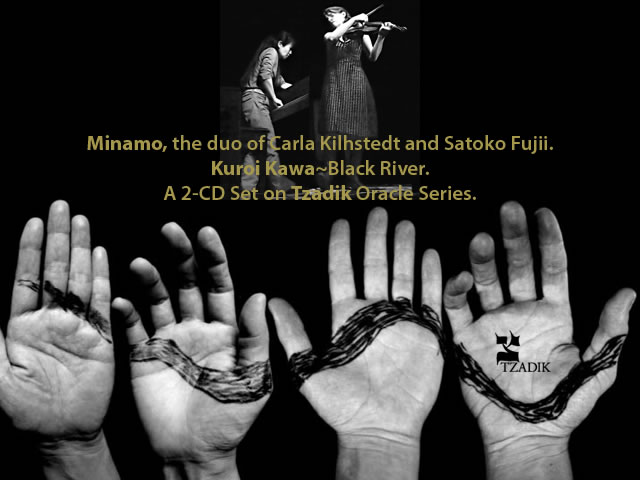Moment's Notice
Reviews of Recent Recordings
(continued)
Wolter Wierbos
Deining
DolFijn 02
 Every Sunday in July 2006, trombonist Wolter Wierbos invited a different partner to join him in duets on his houseboat in Amsterdam. A small audience gathered, the performances were recorded, and the highlights compiled on this delightful CD.
Every Sunday in July 2006, trombonist Wolter Wierbos invited a different partner to join him in duets on his houseboat in Amsterdam. A small audience gathered, the performances were recorded, and the highlights compiled on this delightful CD.
The circumstances of the recording say something about Wierbos. He’s the most convivial of players, content to either play other people’s music or simply improvise. To my knowledge, he’s never led a band or recorded a composition of his own. His two previous recordings under his own name are both completely improvised solo albums. He just seems content to put his heart into the music of someone else, or join another player in an improvised exchange, or to just blow his horn. The low-profile, literally homey setting for the concerts seems appropriate for a man who simply likes to play.
Almost half the disc is devoted to the trombonist’s encounter with bassist Wilbert de Joode and with good reason – it’s a boisterous, no-holding-back exchange that bubbles over with ideas and joy. Like a lot of Dutch jazz, it changes character often, and the changes are often extreme, veering from the comical to the harrowing in the pluck of a string or a slip of the slide. “Aan Lager Wal” barrels along from opening long tones to energized fragmentation to a swinging sprint that crumbles and reassembles several times. “Loefzjide” pits earthquake tremor bass against the sounds of trumpeting elephants and quacking ducks emanating from the trombone. Their concentration on any given motif or sound is absolute, but liable to shift at the slightest suggestion or whim.
If the duet with de Joode is extroverted and flamboyant, the pairing with Ab Baars is more private, intimate. “Buitengaats” is an anxious piece of tenor saxophone sobs and high-pitched alarums from trombone. Mengelberg’s “Peer’s Counting Song” is an understated study in melancholia tinged with irony that saves it from self-pity.
It’s back to quick-change artistry and incongruity when Han Bennink joins Wierbos. The wry joke here is that of the three tracks from their performance, only one is a duet, the other two are solos from each of them. The duet, “Op Der Werk” features Bennink’s jumpiest swing with muted wah-wahs and loopy slide-work from Wierbos. It quickly morphs into a circus march, ending with subdued growling and Bennink’s harmonica quoting “Silent Night.”
Mary Oliver and Wierbos mix late Romantic themes and breathy textural playing in a witty “Hoog Aan De Wind” that segues into another version of “Peer’s Counting Song.” They sidle up the melody and subject it to broader distortions and satiric exaggerations until Bennink joins them to form a three-part duet that detonates the delicate tune with a brief outburst of high-energy blowing.
Individual duets with Frankie Douglas separate the duets with the other players. These emphasize melody and stricter beat, and feature a warmer, lyrical side of Wierbos’s playing. But Douglas has a trickster side as well and even on the dancing, Caribbean-flavored “Innermission” he inserts sly rhythmic disruptions and the occasional sour harmony.
Five very different musical personalities, and Wierbos works graciously and seemingly naturally with each one. Neither he nor any of his partners ever surrender his or her individuality – they somehow make each other sound more like themselves, not less. Refreshingly open hearted and enjoyable, at times brilliant, music.
–Ed Hazell
Eri Yamamoto + Whit Dickey + Daniel Carter
Emergence
Not Two MW 814-2
 The emergence of Eri Yamamoto is largely traced by the press through her distinctive work on William Parker’s sterling Corn Meal Dance, the bassist’s overlooked small gem, Luc’s Lantern, and her own strong collection of duets, Duologue (all on Aum Fidelity), even though the pianist had previously released four trio CDs under her leadership (three on her own Jane Street imprint and one on Thirsty Ear). While she remains far better known in New York, where she has a remarkable track record for holding down lengthy club stands, a vanishing habitat for developing jazz artists, the aptly named Emergence, a thoroughly engaging set of trios with multi-instrumentalist Daniel Carter and drummer Whit Dickey, confirms her arrival on the international scene.
The emergence of Eri Yamamoto is largely traced by the press through her distinctive work on William Parker’s sterling Corn Meal Dance, the bassist’s overlooked small gem, Luc’s Lantern, and her own strong collection of duets, Duologue (all on Aum Fidelity), even though the pianist had previously released four trio CDs under her leadership (three on her own Jane Street imprint and one on Thirsty Ear). While she remains far better known in New York, where she has a remarkable track record for holding down lengthy club stands, a vanishing habitat for developing jazz artists, the aptly named Emergence, a thoroughly engaging set of trios with multi-instrumentalist Daniel Carter and drummer Whit Dickey, confirms her arrival on the international scene.
Throughout the album, Yamamoto's well-hooked comping and streamlined approach to solo construction functions as the fulcrum of the trio. She effortlessly melds elliptical Bleyish phrases with blues and gospel flourishes on “Conversation,” a title that nails the tone of the piece. She juxtaposes block chords with sleek harmonic movement, staccato lines and shards of vernacular on “Rocker;” the lines are decisively cleaved and the touch is spot-on. There is a fine point on her percussive attack on the penultimate “Last Taste;” she mirrors Carter’s churning phrases and wailing long notes and Dickey’s steady stream of cross rhythms. And, she reiterates that less is more on the closing, ballad-like, “Plum Blossom.”
Both Carter and Dickey strike the difficult balance of fire and restraint throughout the album. Whether he is playing flute, saxophones or trumpet, Carter has a Cherry-like proclivity for ending a phrase in a way that is unforeseen by its initial notes. Within seconds, he can cogently give tender phrases a razor’s edge. Dickey also has excellent ensemble instincts. He frequently toes right up to the line, bringing the music to a simmer but not a sloppy boil; conversely, he can be intriguingly minimal. Their contributions are essential to the strong overall shape of the album, a steady build-up to the exhilarating “Last Taste” and the leaves-them-wanting-more “Plum Blossom.”
More can’t come soon enough; Emergence is that good.
–Bill Shoemaker
